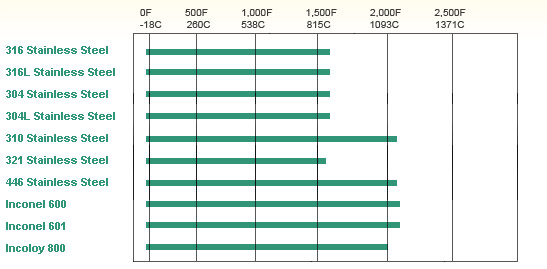Thermocouple Sheath Material
A thermocouple is often enclosed in a protective sheath to isolate it from the local atmosphere. This protective sheath drastically reduces the effects of corrosion.

Specific Temperature Limits
316 Stainless Steel
- Maximum temperature: 1650°F(900°C). Best corrosion resistance of the austenitic stainless steel grades. Widely used in the food and chemical industry.
- Subject to damaging carbide precipitation in 900°F to 1600°F (482°C to 870°C).
316L Stainless Steel
- Maximum temperature: 1650°F (900°C). Same as 316 SST (04) except low carbon version allows for better welding and fabrication.
304 Stainless Steel
- Maximum temperature: 1650°F (900°C). Most widely used low temperature sheath material. Extensively used in food, beverage, chemical and other industries where corrosion resistance is required.
- Subject to damaging carbide precipitation in 900°F to 1600°F (480°C to 870°C) range. Lowest cost corrosion resistant sheath material available.
304L Stainless Steel
- Maximum temperature: 1650°F (900°C). Low carbon version of 304 SST (02). Low carbon content allows this material to be welded and heated in the 900°F to 1600°F (480°C to 870°C) range without damage to corrosion resistance.
310 Stainless Steel
- Maximum temperature: 2100°F (1150°C). Mechanical and corrosion resistance, similar to but better than 304 SS. Very good heat resistance.
- This alloy contains 25% chromium, 20% nickel. Not as ductile as 304 SS.
321 Stainless Steel
- Maximum temperature: 1600°F (870°C). Similar to 304 SS except titanium stabilized for intergranular corrosion.
- This alloy is designed to overcome susceptibility to carbon precipitation in the 900 to 1600°F (480 to 870°C) range. Used in aerospace and chemical applications.
446 Stainless Steel
- Maximum temperature: 2100°F (1150°C). Ferritic stainless steel which has good resistance to sulfurous atmospheres at high temperatures.
- Good corrosion resistance to nitric acid, sulfuric acid and most alkalies. 27% chromium content gives this alloy the highest heat resistance of any ferritic stainless steel.
Inconel 600
- Maximum temperature: 2150°F (1175°C). Most widely used thermocouple sheath material. Good high temperature strength, corrosion resistance, resistance to chloride-ion stress corrosion cracking and oxidation resistance to high temperatures.
- Do not use in sulfur bearing environments. Good in nitriding environments.
Inconel 601
- Maximum temperature: 2150°F (1175°C) continuous, 2300°F (1260°C) intermittent. Similar to Alloy 600 with the addition of aluminum for outstanding oxidation resistance. Designed for high temperature corrosion resistance.
- This material is good in carburizing environments, and has good creep rupture strength. Do not use in vacuum furnaces! Susceptible to intergranular attack by prolonged heating in 1000°F to 1400°F (540°C to 760°C) temperature range.
Incoloy 800
- Maximum temperature: 2000°F (1095°C). Widely used as heater sheath material. Minimal use in thermocouples. Superior to Alloy 600 in sulfur, cyanide salts and fused neutral salts.
- Susceptible to intergranular attack in some applications by exposure to the temperature range of 1000°F to 1400°F (540°C to 760°C).
